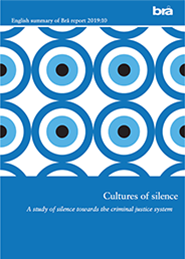- Start
- / Home
- / Publications

Cultures of silence
A study of silence towards the criminal justice system.
English summary of Brå report 2019:10
It has become more difficult to persuade people to report and testify regarding criminal offences. This report aims to answer two overall questions: what motivates the silence and how can more people be persuaded to provide information to the criminal justice system?
Brå has been instructed by the Swedish Government to study the phenomenon of cultures of silence and the offence of interference in a judicial matter, and how they can be counteracted. The background of the instruction is that the criminal justice system has highlighted that it has become more difficult to persuade people to report and testify regarding criminal offences and that there is discussion of cultures of silence in some parts of society. The project aims to answer two overall questions: what motivates the silence and how can more people be persuaded to provide information to the criminal justice system?
In this study, cultures of silence refers to a system of norms among a defined group dictating non-cooperation with the criminal justice system. Individuals can both be influenced by cultures of silence in a group to which they belong and have individual reasons for silence, independent of such cultures of silence. Irrespective of the basis for the silence, what occurs is what we call here silence mechanisms, i.e. different reasons for silence towards the criminal justice system. The subject of our study is thus wider than cultures of silence alone.
The offence of interference in a judicial matter entails that a person, ordinarily through threat or violence, attempts to stop an individual from reporting an offence, providing information in a criminal investigation, or giving testimony at a trial. The offence can also apply to situations where a person has already participated and is therefore exposed to threats, violence, or some similar act.
The study has five focus areas: offences in the context of honour-based violence, domestic violence, criminal networks, offences in socially disadvantaged areas, and offences against and within organisations.
The report is based on own data in the form of interviews with crime victims, witnesses and other individuals, an analysis of convictions with preliminary investigations regarding interference in a judicial matter, and an online survey directed to public prosecutors. In addition, existing statistics and a review of the literature, particularly regarding rectification measures, have been included.
© The Swedish National Council for Crime Prevention, 2019
Authors: Johanna Skinnari, Anna Jonsson and Daniel Vesterhav
urn:nbn:se:bra-864

